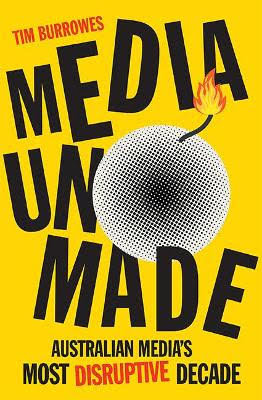I have just finished reading Tim Burrowes’ book “Media Unmade” and my head feels ready to explode.
Burrowes is the founder of Australian media industry site Mumbrella, and he tells me that when he gets into something, he can become obsessed.
He got into this book. It’s 432 pages long and covers the past decade of Australian media history.
No one knows it better than Burrowes. Arriving 15 years ago from England, he made it his mission to really understand how news, entertainment and advertising works in this part of the world.
His conclusions are not pretty but neither are they ideological condemnations of an industry that has been existentially challenged and survived.
One of my favourite quotes from the book comes early on:
The business of newspaper publishing has always been about both upholding democracy and undermining it.
I hadn’t realised this before with such clarity. For “newspapers” we can substitute “companies that produce news at scale”. For all the high-minded statements by news editors and media CEOs, they have often commandeered democratic processes to get outcomes that favour news itself. The contradiction was at its most flagrant with what Burrowes’ calls “the shakedown” of the News Media Bargaining Code that is covered at the end of the book.
If you don’t already subscribe, please sign up for the Crawford Media newsletter.
Kindly inquisitor
I have known Burrowes for at least a decade. He is a man of energy and curiosity, and he speaks with the kind of comfortable English accent that will encourage you to let your guard down. His kindness is real but doesn’t dull his often-lacerating insight into the strengths and weaknesses of people involved in the media. Burrowes is why Mumbrella was a success, from the moment it burst on to the Australian media scene in 2008.
Now he’s leaving, having sold the business in 2017 to events company Diversified Communications and stayed on as an editor-at-large. The odds are stacked against Mumbrella continuing as a vital force in Australian media in his absence. One of the lessons from Burrowes’ book is that “in media, domain experience is everything”.
That means decision makers – whether executives, managing directors, or CEOs – need to have enough experience of a particular medium to make the right calls and lead their particular rag-tag army.
I spoke to Burrowes for this piece, and will publish the podcast of our conversation later this week.

The three acts
“Media Unmade” is structured in three parts, with a prologue and epilogue. The sweep of the narrative is this:
- In the beginning (2010), there was much wilful blindness, arrogance and complacency, which led traditional media companies into deep trouble
- Then came the challenges, scandals and triumphs of the 2010s, and the digital platform companies ate almost everyones’ lunch
- Finally the the Australian media scene was “remade”, with Fairfax dodging death by a whisker and then disappearing into Nine (in 2018), journalists abandoning aspirations of objectivity, and the government muscling Facebook and Google to provide financial support for news
Within this structure there is a vast amount of detail, and even then much is left out. Burrowes mostly removes himself from the picture, with little discussion of small independent publishers and advertising agencies. The book’s subject is the big movements for the big players.
“We start the decade and everything’s up in the air … obviously for different media, they’re all at different points … and then … we get to very recent history and all of a sudden things seem to resolve themselves.”
Burrowes has been around long enough to know that the resolution won’t last five minutes, but it provides a structure on which to hang his observations and insider’s insights. He has used his own original research and interviews, reporting and experience while at Mumbrella as well as other published work to assemble what to me seems the definitive account.
I think few other people could have done it. For most, the requirement for “domain experience” in media comes with ignorance of other areas. The book covers newspapers, TV, the ABC, radio, outdoor, magazines and digital platforms and a couple of bubbles: coupon sites and content marketing.
Blokes aplenty
The narrative is told through industry leaders, and it is noticeable that these are mostly men. Of the 22-strong cast of characters listed at the beginning of the book, only two are women.
“There are now plenty of female executives at quite senior roles across the media, but still remarkably few at CEO level,” Burrowes says. “My mother in the UK was kind enough to read [the book] and she sent me a complaint about that.”
In terms of who comes out well, it is clear that Burrowes admires the achievements of Fairfax CEO Greg Hywood, Nine CEOs David Gyngell and Hugh Marks and ABC Managing Director Mark Scott. They were swimming against the current:
The story of Australian media over the past decade is one in which very few CEOs have left their company in a better state than they found it.
On the other side of the ledger, Burrowes generally reserves his judgments, although ABC MD Michelle Guthrie, The Australian’s Editor-in-Chief Chris Mitchell and CPA CEO Alex Malley are not depicted in a flattering light.
Another aspect not explicitly drawn out in the book, but ever-present: the rate of change in media is frenetic. None of the people mentioned above are in the same jobs now. Perhaps that would be surprising in other industries over the course of just a few years. In media it is not only normal, the rate of change appears to be accelerating.
The perception of acceleration may be an illusion based on the bias of the present, and it would be worth looking at whatever data we have to verify it. Certainly some things – like the repeal of media ownership laws or the merger of Nine and Fairfax – are big changes that won’t happen again.
The end of an aspiration
Most journalists have known that achieving objectivity is impossible in practice, but nevertheless believed it was worth aiming for. In “Media Unmade”, Burrowes documents the movement away from this aspiration through two examples: the experience at News Corp as it moved towards subscription models, and the difficulty of picking apart “holding to account” and partisanship at the ABC.
Burrowes is at his insightful best when he looks at News Corp, because he is one of the few people able to do so without a lot of baggage. I am particularly interested in one moment. At around the time of Executive Chairman Michael Miller’s return to the company in 2015, there was an important mental switch.
It was no longer simply a news and entertainment company, but an organisation that existed to market news and entertainment to paying customers.
News Corp’s publications include a range of editorial tones and a welter of personalities that do not necessarily agree with each other. But as Burrowes tells it, this realisation of the importance of news marketing coincided with the discovery of polarisation as a subscription driver.
At bottom, says Burrowes, the big difference in worldviews between News Corp and others in media – including himself – is that at News they believe it is their first responsibility to give audiences what they want.
A grubby finish
News Corp was also the primary driver behind the development that concludes the book, the News Media Bargaining Code of 2021. This saw the Australian government force Google and Facebook pay publishers for news, having allegedly unfairly profited from free content for years.
Here Burrowes takes a once-removed view that recognises the deal was flawed but effective.
It was a grubby, imperfect deal that had involved the Australian government running a shakedown on big tech. Nobody came out of it with their purity intact. But somehow, for the first time in more than a decade, Australian journalism once more had a guaranteed long-term income stream to support it for the foreseeable future.
On this point I disagree with Burrowes, because the ends shouldn’t justify the means when it comes to legislation, and because there may have been a better longer term outcome for news with a different approach. I ask him about this in the interview: stand by for my first attempt at a podcast in a few days’ time to hear his answer.
With the distance of time, the details packed into this book will fade and only the big picture will be remembered or considered important. But those vast movements are comprised of the myriad actions of individuals, and in more than a few instances it’s clear that individual actions have had big consequences. With “Media Unmade”, Burrowes has become Australian media’s unofficial historian.

